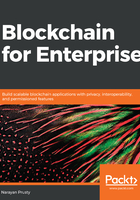
Dubai's housing rental
Dubai's housing rental use case is a blockchain application that let's individual expats lease an apartment or renew their housing tenancy contract online within minutes. In Dubai, if an individual wants to take an apartment for rent, then they have to provide KYC documents, cheques as a contract-term guarantee, and create an Ejari (a government contract to legalize the otherwise unpleasant relationship between landlords and tenants in Dubai). In Dubai, most real estate companies rent apartments only if you want to stay for a longer period of time (for instance, at least a year) and to make sure you obey the contract, they ask you to provide postdated cheques as a guarantee, as in Dubai, a cheque bounce is considered a criminal offence. As the process of renting an apartment and renewing the tenancy contract is a cumbersome process for both tenants and real estate companies, Dubai Smart Government (DSG) (a technology arm of Smart Dubai, a city-wide initiative to transform Dubai technologically) launched a mission to make this whole process easier and quicker using blockchain.
This housing rental application was built using Hyperledger Fabric 1.0, and initially seven entities participated in the network. DSG, General Directorate of Residency and Foreigners Affairs Dubai (DNRD), wasl, Dubai Land Department, The Dubai Electricity and Water Authority (DEWA), Emirates National Bank of Dubai (NBD), and Emirates Islamic (EI) bank were the entities who shared their data on blockchain to make the tenancy contract creation and renewing easier.
Earlier, DSG and the Emirates Identity Authority (EIDA) launched DubaiID, which allowed Dubai residents a unified access to all eServices provided by government agencies through one login, and interaction with them via the internet. In this blockchain use case, the tenant had to log in to the real estate's portal using DubaiID; in this case, wasl's tenant must have a DubaiID to login. Once logged in, SDG will write the Emirates ID number into blockchain, and DNRD shares visa and passport information on the blockchain for that tenant. Then, wasl's portal redirects users to submit digital cheques using an Emirates NBD or EI bank account. Once digital cheques are submitted, a request is made to DLD via blockchain to renew or create an Ejari. Finally, once Ejari processing is done, DEWA is notified to activate the water and electricity supply. So basically, the first pilot was for individuals who wanted to lease or renew a wasl apartment and had a bank account with Emirates NBD or EI. Soon, more banks and real estate companies will be added to the network to provide this service for more people in Dubai. In this process, it was ensured that a piece of information can only be seen by the concerned parties.
This use case fits in well as a blockchain use case because a signed immutable ledger was required to store KYC, cheques, and Ejaris and the latter can be proved if the customer or any entity tries to commit fraud. For example, when Emirates NBD issues cheques, if they do it without blockchain and simply make point-to-point API calls, then there is a very good possibility of intentional and unintentional disagreement between ENBD, the tenant, and wasl regarding the existence of a digital cheque or its current status. Therefore, blockchain can be the final tool for reference if any dispute occurs.